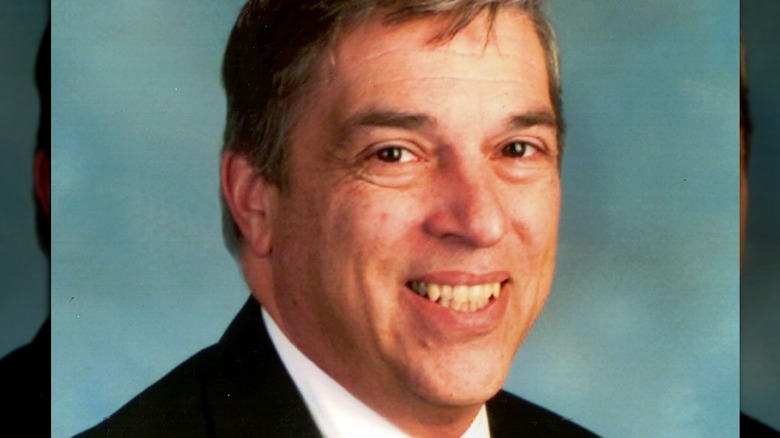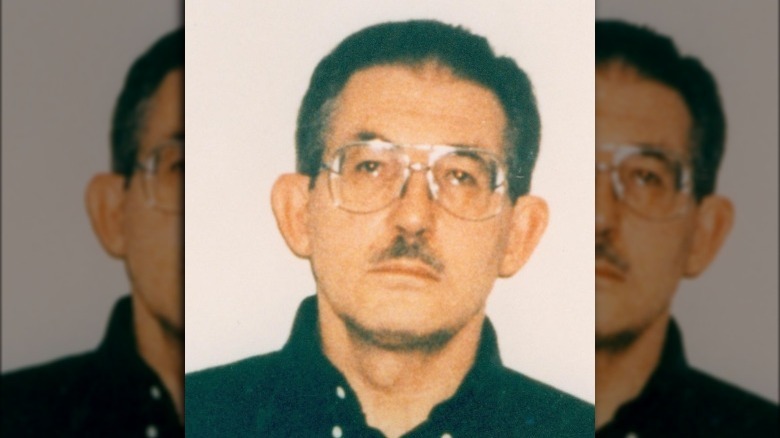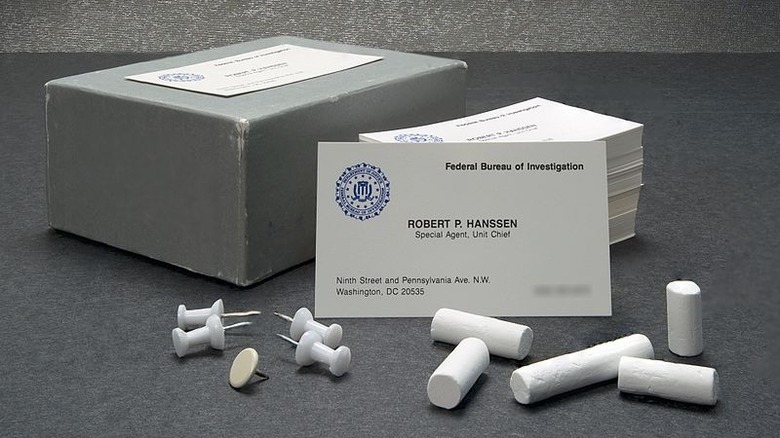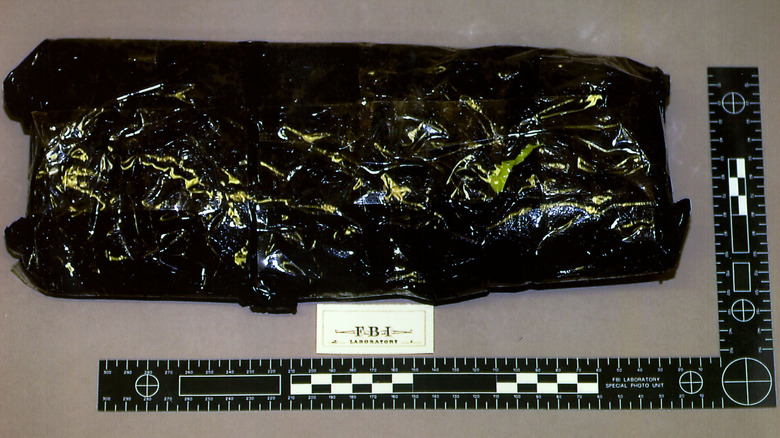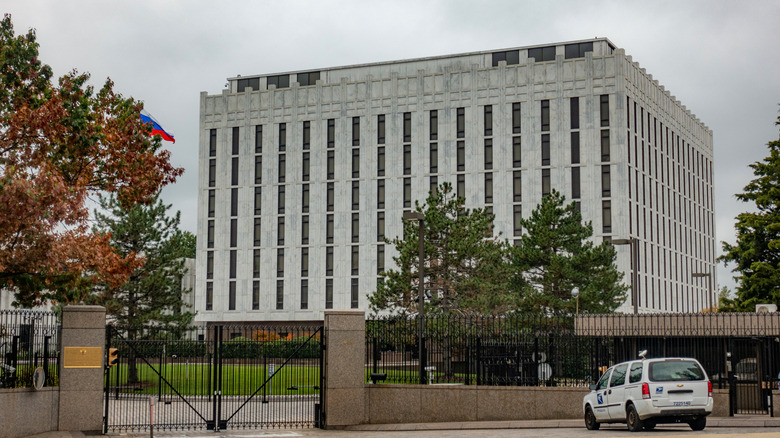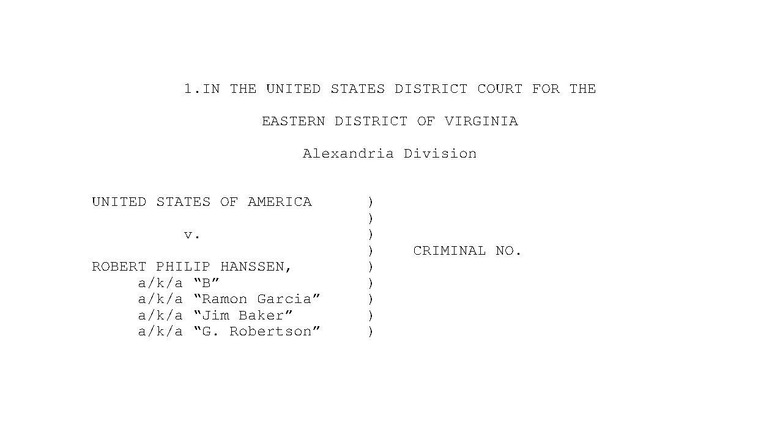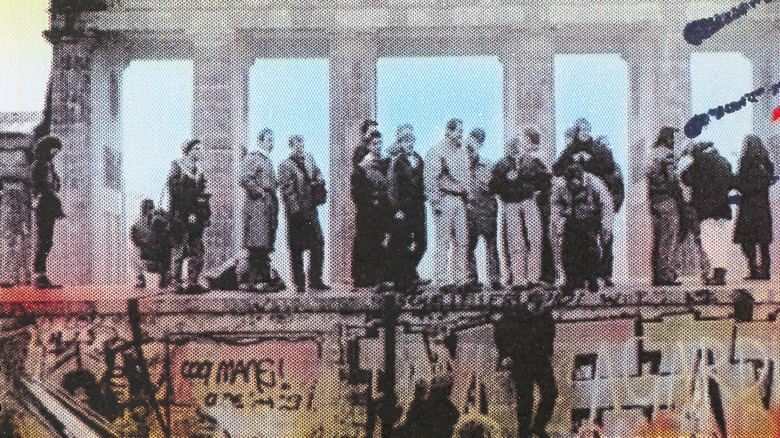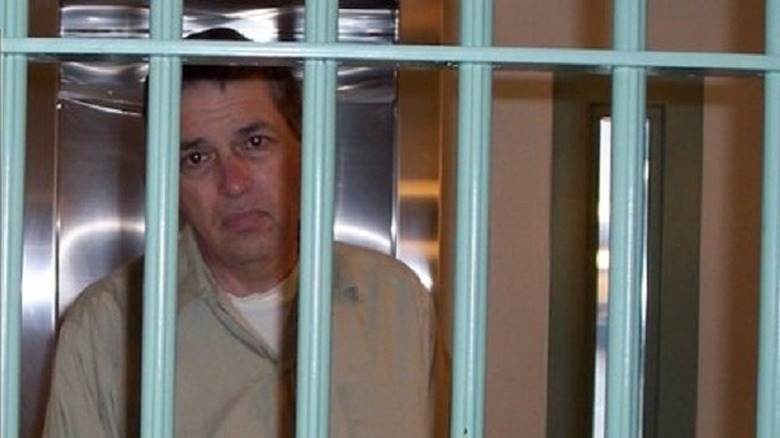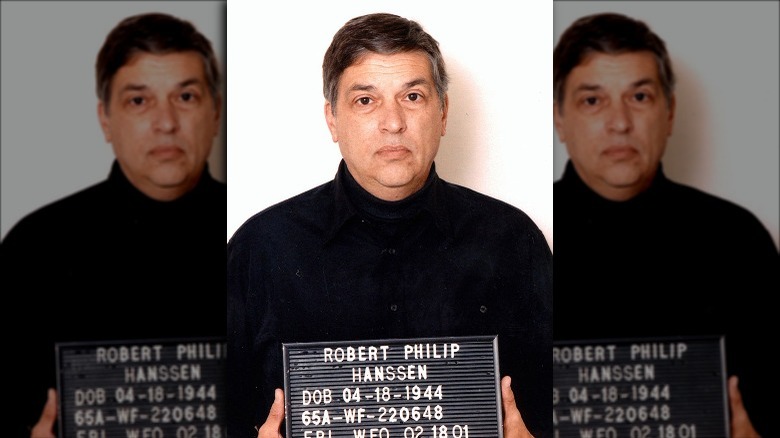The Man Behind The Worst Intelligence Disaster In U.S. History
Spies and espionage. Clandestine meetings and secret codes and world-shattering information passed between hands, all under the radar of the authorities. It makes for exhilarating plotlines for fictional stories, but when all of that stuff actually happens in the real world, well, things get a lot less fun really fast. Especially when the setting is the middle of the Cold War, and the secret information going back and forth between the Soviet Union and the U.S. has to do with nuclear missiles and national security.
Oh boy.
The Cold War has its fair share of espionage stories, with both sides going all in on their double agents and spies and moles. The U.S. on its own has its own collection of absolute disasters, with American agents becoming turncoats, selling out to the Soviets, and compromising major intelligence operations, but one of those incidents stands out above the rest. Or, rather, one person does.
Robert Hanssen, a church-going family man and FBI agent for 25 years, was actually working as a Soviet spy for well over 20 years. Before getting caught in 2001 and sentenced to life in prison, he sold thousands of pages of sensitive material to the Soviet Union and ruined massive U.S. intelligence plans. It was truly a mess.
Moles in U.S. intelligence have caused huge problems
Just for context, Robert Hanssen is far from the only mole or double agent in the history of U.S. intelligence, and not the only one to cause massive issues. All of this stuff is really serious.
Smithsonian Magazine talked about another of the big names when it comes to Soviet spies and moles: Aldrich Ames (above). A CIA agent, Ames spied for the Russians for about a decade, at one point handing over the identities of the double agents in Moscow that he knew of. That leak led to a huge panic in Western intelligence agencies, as they tried desperately to save their compromised agents, failing in countless cases. It was a huge loss that no one saw coming.
Then there's the paranoia. Another Smithsonian Magazine article talks about a 1962 incident. A KGB agent — Aleksei Kulak — offered his service to the FBI, casually mentioning that the KGB was meeting with an FBI agent called Dick. The FBI freaked out, starting something like a witch hunt. No one in the Bureau was safe, and all the agents knew that they were being watched, their phone lines bugged. Dozens of agents were reassigned, just to be safe, and morale plummeted, everyone concerned that their other secrets — drinking problems, extramarital affairs, the like — would also be uncovered. The hunt lasted for years and turned up nothing, aside from shattered trust and widespread panic. It was a mess, to put it lightly.
Robert Hanssen had a lot of access
A big part of why Robert Hanssen in particular was such a huge blow to the U.S. intelligence community was just how much access he had to incredibly sensitive and confidential information. It makes sense why FBI Director Louis Freeh called Hanssen's crimes "the most serious violations of law — and threat to national security" (via FBI).
Over the course of his more than 20 years at the FBI, Hanssen was usually in a position where he could really easily get to information that could be relevant to the Soviets. Starting at the Bureau in 1976, he was part of a Soviet Counterintelligence unit only a couple years later, around the same time he started selling information (via Britannica). Fast forward to the early 1980s, and he was on a Soviet Analytical Unit, where he was looking directly at counterintelligence work against the Soviet Union. And then it didn't take long for him to keep climbing the ranks, supervising those same sorts of units and eventually becoming a Program Manager in the Soviet Section back in Washington, D.C. By the early 1990s, he was the chief of the FBI's National Security Threat List Unit, and even when he was removed from managerial positions in 1994, most of his career allowed him to work largely unsupervised.
The point is that, throughout his time at the FBI, he could always legitimately get his hands on massive stores of information that the Soviets would pay handsomely for.
Robert Hanssen betrayed the names of several double agents
In 1985, Robert Hanssen got directly into contact with the KGB with a letter to an agent stationed in Washington, D.C., which was included in the FBI affidavit presented to the court regarding his activities with the Russians. He pretty brazenly wrote to the KGB agent Victor Cherkashin, offering up his services and ready to prove his worth and loyalty to the Soviets.
So, how did he do that? By giving up a few "bona fides" — basically bits of intelligence that would signify his sincerity in reaching out. Those bona fides immediately revealed the names of three KGB agents secretly working with the FBI — Boris Yuzhin, Sergey Motorin, and Valeriy Martynov — whose identities were classified as Secret. All three had actually been given up by Aldrich Ames as well, earlier that year, and it didn't take too long after Hanssen turned over that information for the KGB to bring them in, executing two of them.
It's the same sort of thing that Hanssen would keep doing throughout his career, keeping the Soviets informed about potential defectors, and sending them internal memos from the FBI regarding people they thought might be Soviet spies.
Leaking Operation Monopoly
When it comes to really big-ticket operations that Robert Hanssen leaked to the Soviets, Operation Monopoly is a pretty major one. So, what is it, then? Basically, according to the Crime Museum, the Soviet Union started working on a new embassy stationed in Washington, D.C., but putting that together ended up running into a lot of issues. Namely the fact that, as the New York Times explains, both U.S. and Soviet embassies were hot topics of debate, because they were also the perfect locations to get some spying done. The Soviets had previously already bugged the American embassy in Moscow, and, unsurprisingly, that led to disputes about how the Soviets might try to further press any advantages they might find to spy on the U.S. intelligence community.
So, in response, the FBI planned to bug the Soviet embassy in Washington, D.C. That involved bugging the building — having access to electronic communications but also being able to actually listen inside the building — as well as digging a tunnel underneath the embassy to be able to further tap into their electronic goings-ons.
It didn't work though. The plans leaked to the Soviets, and the FBI suspected Hanssen (although they only very vaguely mentioned it in their affidavit). As it turned out, he'd actually been allowed to review the plans completely, because of just how expensive they would be, and then he sold them for $55,000, putting all of that intelligence gathering to waste.
In general, Robert Hanssen sold a lot to the Russians
While it would definitely be really interesting to go through every single big top secret project that Robert Hanssen relayed to the Russians, the FBI affidavit doesn't quite go into that much detail (these were all literally top secret, after all). It really ends up reading something like a laundry list of vague bits of information.
Granted, though, even the vague bits are still intriguing (and concerning). Within those six thousand pages of material (via FBI) were frequent reports and analyses on Soviet defectors and capabilities and descriptions of U.S. surveillance techniques. Then there were regular reports on the FBI's Soviet recruitment strategies and on their double agent programs, but the really eye-catching ones have got to be details on the CIA's nuclear programs and the KGB's request for missile technology. Nope, that's not scary at all.
While this long list could keep getting longer and just drone on forever, the more important part of it is the very, very top secret nature of everything he gave away. A good deal of all of those documents have that literal specification, and a smaller group of them are also not meant to be seen by any foreign nationals. Then that's aside from some of Hanssen's own notes; on a full history of KGB penetrations into the FBI, he himself stressed how sensitive the document was and advised that the Soviets keep that information on a need-to-know basis.
The KGB and Robert Hanssen had really good relations
When you go through all the communications that were passed back and forth between Robert Hanssen and his KGB handlers (largely included in the FBI affidavit), it doesn't really read in the way you would expect it to. There's none (or, surprisingly little) of this cold, tight-lipped professionalism. Really, aside from the, you know, illegal selling of state secrets, it sounds weirdly friendly.
Throughout their working relationship, Hanssen's KGB contacts were regularly assuring him that they only wanted what was best for his security and safety. At one point, Hanssen let them know he would be gone for about a year as a result of a promotion and wouldn't be able to communicate. To which the KGB basically said they would just patiently wait and continue checking their call out sites until he returned, telling him to take his time, and even congratulating him for his promotion, wishing him "all the very best in [his] life and career."
And when he got back? Not only did they express their hopes that he and his family were doing well, saying they were sure he was "doing great at [his] job" (which just sounds like such a strange compliment, considering he worked for American intelligence), but that letter actually opened with poetry. Yeah, for real. "What's our life/ If full of care/ You have no time/ To stop and stare?" That's literally in a letter from the KGB. Super bizarre.
Secrecy was clearly Robert Hanssen's strong suit
If you do a read through of his correspondence with the KGB included in the FBI affidavit, Robert Hanssen constantly makes reference to just how risky his position was. He actually made an early point not to tell the KGB anything about himself, only ever referred to as "B," later giving them the fake name of "Ramon Garcia." Then there were the secret call out signs and the coded way of communicating dates and times, essentially by offsetting the parts of the date by six. (1/12/87 actually meant 6/6/86, for example). Then, they would use about 10 different dead drops that they would regularly cycle through, often not using the same one twice in a row (at least, once they had multiple established).
Hanssen was also really invested in keeping the FBI off him. He spent little, so as to not make it seem like he was receiving thousands of dollars, and left nothing lying around (via ABCNews). In the last few years of this whole operation, he would start searching the FBI databases, looking to see whether or not anyone else had started searching for things like his name, addresses he was associated with, or even just the term "dead drop." Granted, at that point, he likely knew they had suspicions about him — at one point, he was actually part of the team to find the mole (himself) and managed to lead them completely off track (via Crime Museum).
Things went south after the fall of the Soviet Union
Once 1991 rolled around, things really changed. With the fall of the Soviet Union, all of a sudden, Robert Hanssen's entire espionage operation was just primed to fall apart. According to Britannica, he sort of backed off for a bit, only getting back into contact with the GRU (Russia's military intelligence, different from the KGB) in 1993. And with disastrous results. He was rebuffed, and the Russians even formally protested it, though he escaped from that unscathed.
Fast forward a couple more years, though, and in 1999, he ended up in contact with the SVR (Russia's new foreign intelligence division, and the successor to the KGB). And while he did spend a couple of years spying for them, the tone of the letters between them really changed. Those included in the FBI affidavit written by Hanssen are laced through with tones of disappointment, strangely enough. He seemed to be at the end of his rope, putting so much on the line for them, and, according to him, only got silence in return. He apparently felt like they'd given up on him, at least, when they weren't patronizing him. It's definitely an interesting read.
Or if you don't like looking for frustration via tone in letters, the FBI also caught him stopping by one of the call out sites time and time again, clearly looking for something and "shrugging his shoulders and raising his arms in a gesture of apparent disgust or exasperation."
How was Robert Hanssen caught?
So, after being so careful for so many years, what brought Robert Hanssen's espionage career to an end? As it turned out, according to ABC News, he was discovered because of a few tips that the FBI received from a source within the Russian intelligence community. They managed to get their hands on some actual documentation that seemed to implicate Hanssen in this entire mess. They ended up bringing him back to FBI headquarters in early 2001 for closer monitoring (via Britannica), but they needed actual, hard evidence.
So they began searching through his stuff. The FBI affidavit goes through the evidence (of which there's quite a bit), explaining that one of his fingerprints was found on a garbage bag used at one of those dead drops. In his car were all of the materials used to leave signals to the Russians — white tape and chalk — the same type of garbage bags used for the dead drops, and whole stores of top secret FBI documents. Then there was a recording of a call, which was identified to be Hanssen's voice, and the undeniable convenience of the dead drop sites being close to Hanssen's home.
But, alright, that's just circumstantial. Ultimately, the FBI had figured out where and when he was scheduled to do another drop and set up agents there who were able to swoop in and arrest him, having caught him right in the act.
Did no one really know what he was doing?
Even with Robert Hanssen's impressive record and skill at keeping the authorities far off of his trail, it's kind of hard to believe that he was able to go for well over two decades without being caught at all. Right? How could literally no one know? Well, someone did know: his wife. And a priest.
Basically, it was still early on in his time as a Soviet mole — around 1980. The New York Times says that his wife ended up catching him in the middle of trying to hide a bunch of papers in their basement, and in the process, found out that he was having some sort of dealings with the Russians. He claimed to be feeding them false information, and she believed him, saying after his arrest that he never told her that he was spying. (She actually had to do a polygraph test about this entire ordeal, which did exonerate her. She truly wasn't involved at all).
Nonetheless, she forced him to go to the Church and confess, where a priest promised not to turn him over to the FBI. So long as he donated the $30,000 from the Soviets to the Church and promised to stop spying. And then, to her, that was it. He made his payments and claimed not to be working with the Russians again. She never knew that, just a few years later, he was back to his old ways.
What were Robert Hanssen's motives?
To put it really simply, Robert Hanssen probably did everything for the money. According to History, as far as anyone can tell, he didn't seem to have any sort of ideological stake in any of this — seems fitting then that he just racked up well over a million dollars in cash, assets, and holdings in a Russian bank.
Weirdly enough, though, he didn't really spend much (at least, relatively). While Aldrich Ames was found out because he was spending more than should've been possible, Hanssen says in his letters (included in the FBI affidavit) that he knew he couldn't use it. It would trip the "drug money" alarm, according to him, which had him instead start asking for payment in jewels like diamonds. Even if he couldn't spend the money, assets like diamonds could be some "security to [his] children." Beyond that, though, there's not a whole lot of reference to what exactly he actually planned to do with the wealth afterwards, though.
But while money seemed to be his main motive, he did speak to some less-than-flattering views of the U.S. He saw the country as something like "a powerfully built but r*tarded child," potentially dangerous but easily manipulated, at least on the days when it didn't suddenly turn into a determined and genius "idiot savant." Sure, that's not exactly motive or anything, but it's definitely an interesting point of view, and one that seems like it speaks to some sort of frustration.
